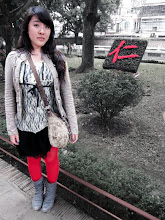By this time on Friday, I’ll be sitting in the international departures terminal of LAX— stalled for a syrupy seven hours on the first leg of my US passport’s maiden voyage. My clothes will be just a little rumpled, my face slightly less bleached of soul than that of the sullen girl looking out from the passport photo, subdued in her new nest of patriotic stripes.
The time will rasp against my nerves like sackcloth on consecrated skin. As the fluorescent hours tick by, I’ll forget the look of daylight, the press of night. I’ll be tempted to pay for wi-fi but will instead bed down in a cocoon of quiet at gate whatever, braiding and rebraiding my hair. I will sigh often, reapply lip gloss every few hours.
I tell my friends I became a US citizen for the fellowships. To pay my way back to the classrooms and libraries of Asia, I joked, I’d be more than willing to stand high-heeled in a glossy auditorium, disavowing both my green card and my allegiance to foreign princes to the brassy accompaniment of Pershing’s Own. My mom, naturalized five months before me, cried at her ceremony. Not for joy or honor or even longing for the homeland— the Black Dragon River that snaked its icy way through her childhood, the mother she sees every two years after hoarding off-days, even the thoroughfares teeming with strangers whose rudeness is through her native tongue made comic, sweet. China will always be home to my mom. It was just the sudden shock of realization, she said, seeing under floodlights the bitterness of her years here.
It’s that Chinese formulation I always twist into a joke, “eating bitterness”. And I try to realize through my insulating layers of youth and privilege that this trope has built the house I live in, stitched the clothes I wear. It sounds so maudlin when I put it that way, so I’ll stay instead: I’m grateful when I remember to be. I'll try to remember.
My mom says her cohort of new citizens, who raised up in oath hands that had felt the sun of every continent— they all cried. Many of them were comfortably middle-class by now, pledging allegiance in well-shined shoes and well-fitted dresses, stress lines creasing their faces in their middle age. At my ceremony, I felt young and bored and tired. It was like a high school graduation. When it was over, I didn’t stay for pictures with the judge, rushing off instead to turn in passport papers.
Now I can fly into Sungshan unimpeded. I don’t know what happened to my old passport, with its stiff jacket of guilty red.
I don’t know what the point of this is exactly—I’m not trying to tackle cross-straight relations yet, or identity politics. I’ll get to those another day, when I’m procrastinating on some kind oral report in the steaming maw of the Taiwanese summer, nursing my necrotic English and a mug of wulong tea. I sound so serious now but it all feels silly, like I could press a fingernail into the grandiosity of my words and they would collapse in a whirl, the sawdust of Amy Tan-style melodrama. This is the peculiar angst of the child émigré, the pampered wayfarer who pictures herself bobbing in the cultural equivalent of the Atlantic Ocean. It tastes like vinegar, unpleasant and mundane, and I'm aware of how much of a trope I am, the contemplative third-culture brat. It's so easy to make all the right wistful noises, but I'd hate to end up as just another ethnic almost-poet sorrowing in the most banal way, heartsore and howlin' at the moon.
There are real anxieties buried under the pyrite veins of my prose. I’d like to extract them maybe, but I don’t want to take myself too seriously just yet, to strive for truth without all this dangerous wordplay like Isadora’s scarves. I like obscurantism. I’m the kind of girl who’d wear veils if they were socially acceptable, instead opting to cover her face with dazzle camouflage in orchid and peacock shades. I speak in metaphors tacky as shawls; I mix them irresponsibly, apologetic and self-aware. But I also like precision.
My language is a kind of halfway house, I guess; I can’t commit myself to the sobriety of analytic rigor. I’ve got an economist’s soul and a poetaster’s sly mouth. There are ways to say this using a more contextually appropriate lexicon of analogy. I use words recklessly, like a Daoist, but like a Confucianist I try to keep my thoughts straight.
In Chinese, at least, my language goes straight instead of slant, compelled by the compass of correctitude. Wandering alone through Harbin in the tea-tinted afternoons, I spoke sometimes to strangers and sounded so very sane. In Taipei, too, I’ll be schoolgirlishly earnest. But for now I’ll shroud my thoughts in diaphanous metaphor; I'll strain my sensibilities with the gaudiest diction.
I'll look over my words and laugh.
The Dao of Pandemic
5 years ago


This entry reminds me of a journal I kept of my first months in Korea. I still go back and read it sometimes...wishing I had kept it up.
ReplyDelete